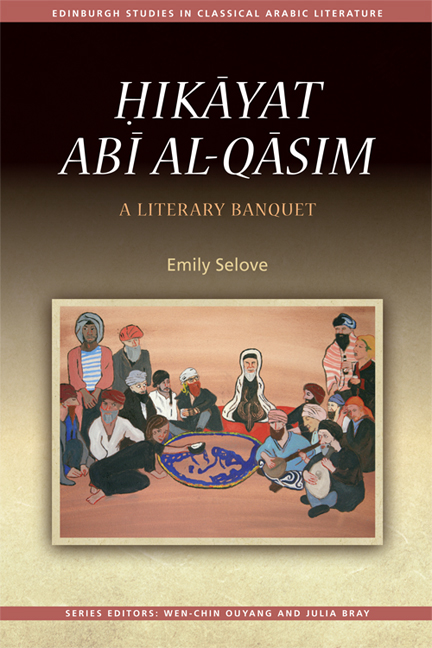4 - Mujūn is a Crazy Game
Published online by Cambridge University Press: 05 September 2016
Summary
‘De balena vero sufficit, si rex habeat caput, et regina caudam.’ Bracton 1.3, c. 3 … A division, which in the whale, is much like halving an apple; there is no intermediate remainder.
Melville, Moby-Dick, ‘Heads or Tails’‘“Come!” cried old Omar. “Let us drink, and break into new patterns the tedious roof of heaven!”’
F. V. Morley, My One Contribution to ChessDespite the topsy-turvy atmosphere of the text, the Ḥikāya may invite readers to use it as an encyclopedia of material goods or otherwise as a source of historical and antiquarian interest for a number of reasons. One of these reasons is its obscenity, or focus on ‘low’ topics not typically addressed in other forms of literature. The Ḥikāya often employs a literary style known as mujūn, distinguished by its focus on low topics and use of obscene vocabulary. In ‘Arabic Mujūn Poetry’, Julie Meisami writes: ‘Discussions by Arab scholars typically adopt historical, sociological, or biographical approaches’ to mujūn literature, whereas ‘the literary aspects of mujūn poetry have received little attention.’ We must strive to understand the literary definition of mujūn itself, however, before attempting historical or antiquarian readings of the Ḥikāya. This is not easily done, and indeed Zoltan Szombathy devotes an introductory section and an appendix of his book on mujūn to the task of defining this word alone.
Here, in discussing the chess game played in the Ḥikāya, I will show that mujūn itself can be thought of as a kind of game, and that thus the style of language known as mujūn is by definition playful. In the introduction to his edition of the text, Mez identifies the chess game as the only section made of entirely original material in the Ḥikāya. Here I will argue that the chess game can be read as a synecdoche for the work as a whole. With its specific and familiar-sounding details, it tempts us to try to reconstruct the game exactly as described. Upon closer examination, however, we find that the events described are impossible to reconstruct because they are each presented only as hypothetical examples of events, as well as being couched in playfully disorienting language.
- Type
- Chapter
- Information
- Hikayat Abi al-QasimA Literary Banquet, pp. 119 - 134Publisher: Edinburgh University PressPrint publication year: 2016

